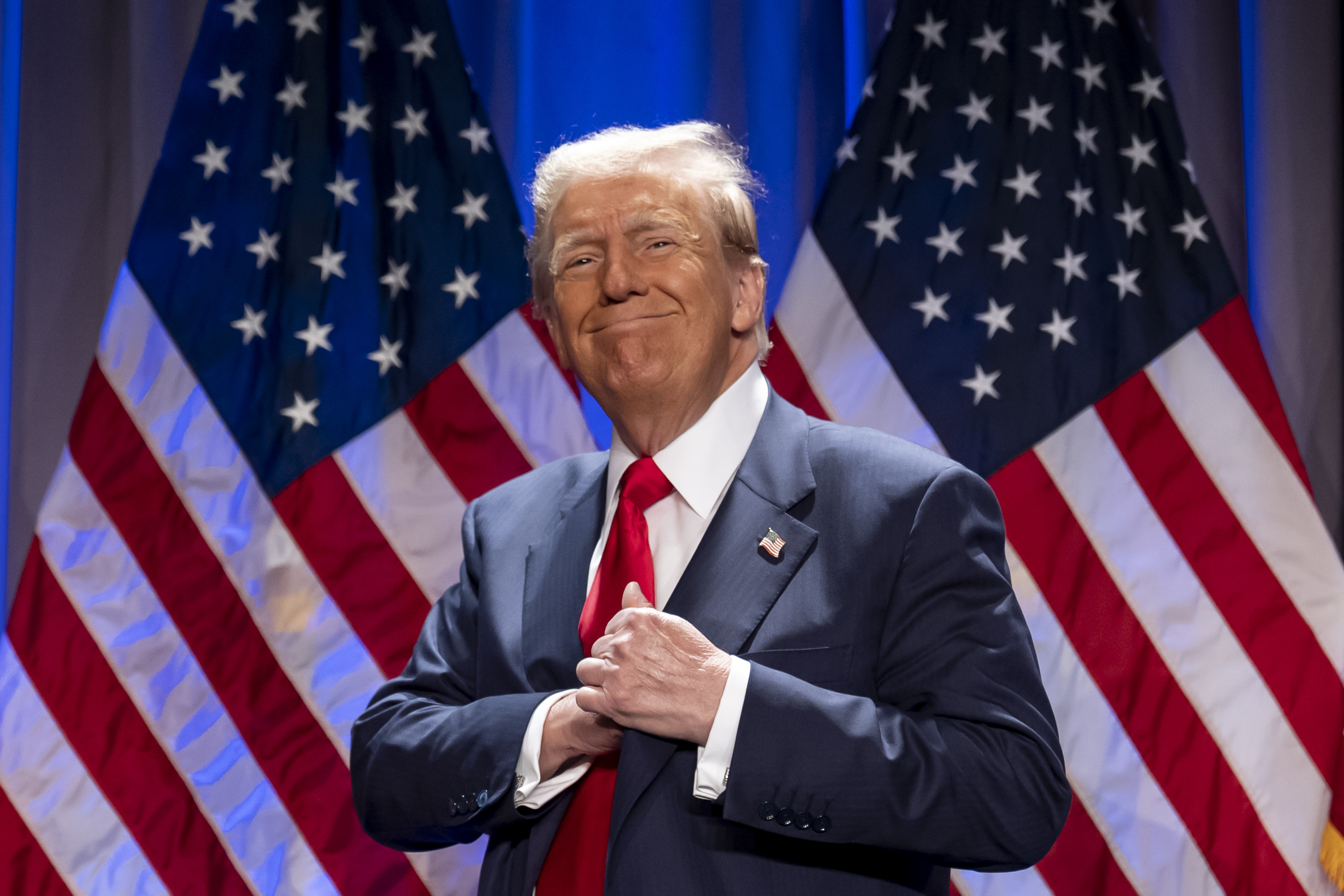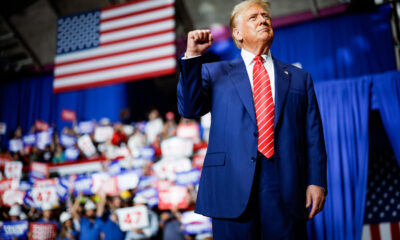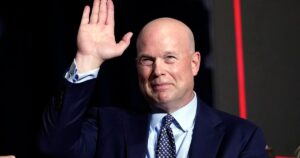Politics
When being mentioned for a White House job is almost as good as getting the job itself

When Kevin McCarthy’s name circulated for months as a “dark horse candidate” to be Donald Trump’s chief of staff, the former House speaker didn’t embrace the possibility — but he didn’t deny his interest, either.
His noncommittal posture was part of a time-honored Washington tradition that’s gone into overdrive in the leadup to Trump’s second inauguration: People in the private sector who reap the benefits of being name-checked for high-level administration jobs, even if the idea they would be chosen for or accept a role amounts to little more than speculation.
In short: If the buzz doesn’t result in a new job, the appearance of proximity to power can result in new business. Getting mentioned for an administration job is almost as good as getting the job itself.
The phenomenon is a quintessential part of the launch of a new administration, though few if any are willing to admit it’s a tactic they themselves have employed. A new cast of characters is jockeying around town to be seen as close to the incoming White House so that they can collect hefty sums from those seeking to influence policy-making. McCarthy isn’t lobbying, but being floated for a powerful White House job can’t hurt his new paid-speeches gig.
Lobbyists and business consultants in particular are looking to sell any connection they can to the president’s inner circle. Jeff Forbes, a political operative who founded the lobbying firm Forbes Tate Partners, said the practice is a common P.R. strategy for those looking to grow their business downtown.
“This is one of the oldest games in Washington,” said the lobbyist. “Best-case scenario you’re picked, and worst-case scenario you end up looking pretty attractive to potential clients.”
There’s no better time than the present for people with legitimate knowledge of the Trump orbit. Ivan Adler, a recruiter dubbed the “Lobbyist Hunter,” said there was lots of hunger for people with connections to the incoming president. In fact, business was so good for K Street during Trump’s last administration that lobbyists close to him were able to set up successful and enduring shops in Washington. Among them were Brian Ballard and Jeff Miller, who have since become two of the biggest figures on K Street.
Another twist: If a lobbyist’s colleague is selected for a prominent post in the administration, that lobbyist’s stock also rises — an inside connection in the White House is an enormous asset to present to prospective clients. And so personnel decisions can have a big ripple effect on who’s up and who’s down on K Street.
“Everyone’s got a different approach to marketing, but that’s just what it is: marketing,” said one longtime Republican lobbyist granted anonymity to speak freely. “It’s a tale as old as time.”
Some names often seem to make the rounds in the lead-up to a Republican Inauguration Day. Among them is Wayne Berman, who leads Blackstone’s government affairs team and whose name was most recently raised for deputy Treasury secretary. Former Trump Interior Secretary David Bernhardt, who has been working as a policy adviser at the lobbying giant Brownstein Hyatt Farber Schreck, was floated as a sleeper candidate for chief of staff (even though Trump’s de facto campaign manager Susie Wiles was widely seen as the frontrunner), attorney general, or Interior secretary.
“Being perceived as being plugged in with a new in-crowd is good for business and social invitations,” said Bruce Mehlman, a Republican lobbyist who runs his own shop and emphasized this was not a tactic he used. “That’s just a truism that we know.”
The D.C. strategy of name-floating in the press has a long history. But it can be a risky play, especially in Trump’s orbit, where getting ahead of the president or putting one’s own ambitions before his is among the gravest sins.

Trump is notoriously hostile to those who are believed to have leaked to the media, and Trump allies expressed deep skepticism of those who tipped off the press to their own names. Although it is a powerful marketing strategy, it does not speak to their real influence, the Trump allies said.
“People use [the] transition to gin up their profile knowing full well that they have no opportunity to join this transition,” said one former campaign official. “I think people need to be skeptical when they read names.”
There are other benefits to getting one’s name in the press beyond an immediate payday. Invitations to exclusive parties can pick up, and bragging rights among colleagues can be secured. A group of Trump allies recently received a message about Rep. Thomas Massie’s (R-Ky.) name circulating for Agriculture Secretary and laughed at the suggestion, added the former campaign official, who was granted anonymity to speak freely. Massie had backed Florida Gov. Ron DeSantis in the Republican primary and was looking to rehabilitate his image, the person suggested. (A spokesperson for Massie did not return a request for comment.)
“People who float their names out are not in the mix,” said one former Trump administration staffer who’s now a lobbyist. Typically those people “aren’t as close to the center” as they would have others believe. “I think you’ll have a lot of those types in this administration.”
Even before the election, a person close to McCarthy suggested that the former Speaker was satisfied with his new post outside government, while his name was still circulating for various positions.
“I still think he’s pretty happy,” said the person close to McCarthy.
There could still be a payoff for McCarthy after trading his gavel to be a different kind of speaker. The former California congressman enlisted an agency to help him land speaking engagements. Among his clients: the American Hospital Association, the French bank BNP Paribas, and snack industry trade association SNAC International.
McCarthy has spent years working his way back into Trump’s good graces, following the fraying of their relationship after McCarthy publicly said that Trump was at least partly to blame for the riot at the Capitol on Jan. 6. And after the former speaker’s ouster, his juice in Washington had significantly dried up.
But more recently, McCarthy has repaired his bond with the incoming president. And having his name in the running for chief of staff has offered a renewed kind of relevancy.
Politics
5 things you need to know about Pam Bondi
One of Donald Trump’s most loyal supporters just got picked for one of the most important roles in his second administration.
Pam Bondi, the former attorney general of Florida, was chosen Thursday to be the nation’s top law enforcement official by Trump just hours after Matt Gaetz withdrew from consideration in the face of Senate opposition.
Bondi is a partner at Ballard Partners, the lobbying firm that had been run by Trump’s incoming chief of staff Susie Wiles and whose founder, Brian Ballard, is a top Trump fundraiser. She is co-chair of the law and justice division at the pro-Trump America First Policy Institute, which has been likened to a Trump administration in waiting.
Bondi is a longtime Trump ally and after he was elected in 2016, her name was floated for various jobs in the administration but it never panned out.
She appears more likely to have an easier path to confirmation as attorney general than Gaetz, who was dogged by allegations of sexual misconduct and illegal drug use.
Here are five things to know about Bondi:
She was the first female attorney general in Florida
Bondi served as Florida’s attorney general from 2011-2019, the first woman to hold the office. She initiated the state’s litigation against opioid manufacturers. It was settled after she left office.
She left office because of term limits and worked for Trump’s transition team after his first victory.
She has a close relationship with Lara Trump
Bondi has a close relationship with Lara Trump, the president-elect’s daughter-in-law and chair of the Republican National Committee. The two campaigned together against a ban on dog racing in the state.
On Tuesday, Bondi advocated for Lara Trump to be the replacement for Sen. Marco Rubio, Trump’s pick for secretary of State.
She’s a former Trump lawyer
Bondi assisted Trump in his first impeachment fight as a senior adviser and lawyer, making the rounds on TV to help his case. Trump was impeached on charges of abusing his power and obstructing congressional investigations but the Senate acquitted him of the charges.
She nixed the Trump University fraud case
In 2016, news emerged that Trump paid a $2,500 fine because his foundation improperly donated $25,000 to Bondi’s political election committee in 2013 before her office opted not to pursue a fraud investigation into Trump University. Trump eventually paid $25 million to settle fraud complaints against the now-defunct university.
Bondi said she was unaware of Trump University complaints at the time and that the contribution had nothing to do with her office’s decision not to pursue the case. Trump has said he admired Bondi for never backing away from him amid the controversy.
Her dog custody battle played out publicly
Bondi was involved in a custody battle with Hurricane Katrina victims over a St. Bernard she adopted in 2005 after the dog was separated from his family during the storm.
The family had been trying to find the dog and Bondi refused to return him. She accused the family of neglect the animal, an allegation they denied.
The family sued, and the dispute lasted 16 months until the two sides settled before trial. Bondi returned the dog to the family with food and medication.
Politics
Trump once shunned Project 2025 as ‘ridiculous.’ Now he’s staffing up with them.
Donald Trump spent his presidential campaign running from Project 2025. Now, he’s using it to stock his White House and administration.
In recent days, Trump has tapped nearly a half-dozen Project 2025 authors and contributors, including Brendan Carr, who Trump picked this week to lead the FCC; former Rep. Pete Hoekstra, who got the nod for ambassador to Canada; and John Ratcliffe, who was tapped for director of the CIA. One of Trump’s first selections — Tom Homan as “border czar” — was also a Project 2025 contributor.
The next Project 2025 alum to join the administration could be Russ Vought, the president-elect’s former director of the Office of Management and Budget, who is being closely considered for a return to the role, POLITICO reported this week. That’s despite Trump once calling the group’s work product “absolutely ridiculous and abysmal,” and the leader of his transition team, Howard Lutnick, saying the group had made itself “nuclear.”
Not anymore.
“I don’t think the Trump administration sees Project 2025 as toxic,” said Michael Cannon, director of health policy at the CATO Institute, who advised The Heritage Foundation project but declined to be listed as one of its authors. “So, it should not surprise us when some of the people who contributed to that effort get picked up by the administration.”
Now Project 2025 alums are slated to have key roles in his administration — particularly on the economy, immigration and dismantling the administrative state.
And with the most recent round of controversial Cabinet nominees, Cannon quipped, the Trump transition is “doing their level best to make Project 2025 look reasonable.”
Still, there are limits. Roger Severino, an anti-abortion stalwart who held a prominent role at HHS during the first Trump administration and was the lead author of Project 2025’s health care chapter, was rejected by Trump’s transition team to fill the No. 2 job at the agency over his participation in the project. Anti-abortion groups had lobbied hard for his nomination, but Trump’s team is trying to distance itself from the strict federal curbs on abortion Severino called for in Project 2025, after running on promises to leave the issue to the states.
In some cases — like Vought — it’s unclear whether the influence of Project 2025 alumni ever truly ceased, even when Trump repeatedly disavowed the project on the campaign trail. Despite those pronouncements, Vought has played a key role behind the scenes, informally advising the Trump campaign on trade and economic policy alongside Trump loyalists like Vince Haley, the campaign’s policy lead, and Robert Lighthizer, Trump’s former trade chief.
Vought wrote a section of the Heritage report on paring back federal spending and regulations, as well as Project 2025’s 180-day transition paybook. In an appearance on Tucker Carlson’s show on X, he said he would pursue a “massive deregulatory agenda” alongside Elon Musk and Vivek Ramaswamy and be “as radical or aggressive as you can” in reducing full-time federal employees and contractors.
Officials at The Heritage Foundation, amid a rocky summer where some prominent Republicans were criticizing the group — namely, top operatives on the Trump campaign, like senior adviser Chris LaCivita — were already anticipating that their standing would vastly improve after the election. Throughout much of 2024, the think tank took the position of “we’re going to slide down a little bit and be quiet,” said a Heritage official granted anonymity to speak freely.
But by October, the official said, there were already signs that there “was less cautiousness about Project 2025 and Heritage,” giving way to quick nominations of Heritage fellows and Project 2025 contributors to Trump’s new administration.
At a book release party last week for Heritage President Kevin Roberts — whose September publication date was pushed back until after the election, amid concerns about the Project 2025 brand — Rep. Ralph Norman (R-S.C.) was among several members of Congress there to lend support for the organization.
“I told Kevin, I think it helps,” Norman told Blue Light News of all the backlash and hand wringing over Heritage and Project 2025 in recent months, arguing that the publicity would ultimately serve to be helpful to the organization implementing its agenda.
That’s certainly not how Trump’s team saw things for months, though.
Democrats proved successful in raising awareness of the group’s plans, an effort that began in February and picked up traction by early summer. Voters began bringing up Project 2025 organically in focus groups conducted for President Joe Biden’s reelection campaign. Google searches started picking up, peaking in July.
That was around the time where Trump himself issued a statement on Truth Social, writing that “some of the things they’re saying are absolutely ridiculous and abysmal,” and claiming he had “no idea who is behind it.”
Sensing a threat, MAGA Inc., the main super PAC supporting Trump, launchedits own Project 2025 website this summer, calling it a “hoax” and trying to capture concerned voters’ search traffic.
But those close to Project 2025 stress that Trump isn’t likely to adopt its recommendations wholesale.
“It was never accurate to say that Project 2025 was the Trump agenda,” Cannon said. “But he’s certainly friendly to parts of Project 2025 — particularly the most concerning, repressive parts, like immigration restrictions.”
The trade chapter of the report, for instance, included separate arguments for free trade and protectionist policies, reflecting a deep divide within Trump world over tariffs.
“Remember, you had Heritage giving 30 pages to a defense of free trade,” Cannon added. “So, there are also things in there that Trump doesn’t like and would never do.”
For Democrats, the spate of hires come as a deflating — if not unexpected — development in the transition. During the presidential campaign, Democrats went all in on linking Trump to the controversial blueprint, a controversial, hard-line conservative agenda. President Joe Biden’s rapid response team decided in February to start hammering the issue, according to a person with direct knowledge of the strategy, eventually seeing the effort take off ahead of Biden’s collapse in the June debate. Kamala Harris, after replacing Biden atop the Democratic ticket, spent at least $5 million tying Trump to Project 2025, according to AdImpact.
In response, Trump distanced himself from the project — only now to turn to some of its authors for roles in his administration.
“It’s the least surprising revelation that we’ve seen in this administration,” said Michigan state Sen. Mallory McMorrow, the possible Democratic National Committee chair candidate who hoisted an oversized prop version of the 900-page policy plan at the Democratic National Convention and railed against it during prime time. “You can’t look at something that had 140 members of the previous Trump administration who had a hand in writing this, and believe for a second that he had no idea what this was. So, yeah, it’s, ‘I hate to say I told you so, but I told you so.’”
Politics
TSA administrator makes bid to stay on under Trump
Transportation Security Administration chief David Pekoske is signaling that he’d like to stay on in his current role as President-elect Donald Trump begins his second term. During a segment about Thanksgiving travel with CBS on Tuesday, Pekoske was clear that he’s hoping to stay until his term ends in 2027…
Read More
-
Congress2 weeks ago
Trump’s border czar promises ‘hell of a lot more’ deportations than first term
-
Health Care2 weeks agoAnti-abortion forces broke the left’s post-Roe winning streak, but 7 more states enacted protections
-

 Politics1 week ago
Politics1 week agoDonald Trump has weaponized ‘main character energy’
-
Economy2 weeks ago
Fed moves to protect weakening job market with bold rate cut
-

 The Josh Fourrier Show2 weeks ago
The Josh Fourrier Show2 weeks agoDOOMSDAY: Trump won, now what?
-
Environment2 weeks ago
Ex-energy regulator says he offered Trump team plan to cut his old agency
-
Environment2 weeks ago
A Chinese solar giant came to America for a Biden windfall. Then Trump won.
-

 Politics1 week ago
Politics1 week ago4 takeaways from the first look at Doug Emhoff’s BLN interview with Jen Psaki


